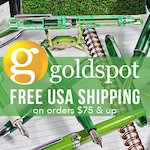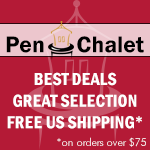(Caroline Foty's first fountain pen was a 1970s Sheaffer No Nonsense that still writes perfectly. Since she discovered pens by independent makers, she wants "one of each, please" and wants to meet all the makers. Maybe you do, too. She lives in Baltimore with pens, cats, and all kinds of fiber arts supplies.)
Jim Hinze gets something out of being a pen maker that he doesn’t get out of his demanding but ordinary day job as a software engineering director. “I like the shock and awe of telling people what I do!”
In the mid 1990s, he was in a woodworking guild where he lived at the time in Michigan, mostly making furniture, when he saw a demo at a guild meeting of how to turn a component (“kit”) pen. The demonstrator brought extras, and invited attendees to stay after the demo to give it a try. “I fell in love, and gave up the furniture for making pens – it was so much fun.” After nine or ten years, however, it began to get just a little stale. With the encouragement of the Masters of the Fountain Pen series on YouTube, which featured venerated Japanese artisans, he made the leap from component to custom (“kitless”) pens.
Since that time, the Hinze Pen Company has grown to include two employees. Francisco Lopez is part owner of the company; Hinze says, “He handles the things I can’t stand, that involve talking to people. I’m not really a people person.” Lopez is behind the large number of retail collaborations Hinze has undertaken in the past couple of years. “It took a long time to get a retail presence. Now, if you go to the website of Atlas Stationers or Pen Chalet you can see Hinze in the brand list. It’s the coolest thing.” There have also been collaborations with Dromgoole’s, Vanness, Enigma Stationery, the Gentleman Stationer, Papier Plume, and of course The Pen Addict.
However, this same cool thing leads to the question: “Now, how do we keep up with demand?” They recently shipped over 120 pens to Atlas Stationers alone. “Francisco will come in and polish if we get in a bind but I generally don’t let him near the shop!” Hinze looked no farther than family gatherings for help. Rachel Neal says, “He’s my uncle. He was saying he wanted someone to come learn to make pens. I needed something to do on the weekend, so I said I’d polish. He said “Oh no, you’re making pens.” She soon quit her day job as a phlebotomist to work full time on pens. “I broke everything you can break in the shop the first time, and he didn’t fire me.”
Both Hinze and Neal have tried their hand at making materials, and have ceded that territory to Elyce Longazelle, Hinze’s partner. Hinze says, “My first year officially in business, I did a collaboration with Papier Plume, to make both the resin and the pen. I took two or three tries at the material, and Patrick Rideau just wasn’t satisfied. Elyce was already an artist. She looked at what I was doing, and said, ‘Get out of the way,’ and her first try was exactly what Patrick was after.” Neal says, “I thought it would be fun, last time I tried it came out ok but I made a mess. I can just go to Elyce and she does it. I get more satisfaction out of the pen.” Longazelle now makes materials under the brand Starry Night Resins.
Neal is not the only person who has learned the penmaking art from Hinze over the years. Many makers cite his presentations and lessons as part of how they got off the ground. “For my first four years, I attended kit pen maker gatherings, and as I got better at it I’d do a demo, make a pen in 90 minutes on stage, and do some one on one sessions too.” His presentations are much less frequent these days, and he has a specific set of points he feels it’s important to make to aspiring craftspeople. “If you’re going to make this journey, you’d better know your audience, talk paper and ink and nibs. If a new maker brings me a pen, I ask, ‘Do you really want my opinion?’ because I’m not going to pull punches. The vast majority of them take it to heart.”
Hinze is careful about his sources of inspiration. “I don’t look at other makers’ stuff for ideas. Imitation is a big no-no. There are too many people who won’t use their creative minds. You need to differentiate yourself - if you look at a given row of pens you should be able to tell they were all made by different people.” He derives inspiration from photographs of landscapes and animals, exchanging images with Longazelle to develop materials. Hinze Pens has fifteen core shapes across four platforms, and PDFs on their site show the shapes and sizes. Hinze cites the classical Golden Mean as driving the proportions of their pens. “We make sure when we’re doing something, that it's not just like something someone else is doing.” One thing Hinze has done to stand out is introduce color plating on nibs and clips. They are now selling some of these items to other makers, as well as rarely allowing other makers to buy Starry Night rods.
Current directions for innovation include some filling system variety. Trying to create piston mechanisms that are more durable than the 3D printed ones, they have sourced metal components. They are also working on a vac filler, and a retailer has requested a button filler that uses a sac. “We can’t get into a rut and make the same thing day after day.”
Neal says, “I came in knowing nothing. I grew up in this already established environment. I have my own ideas, though, even though sometimes Jim will say, ‘That’s not going to work!’” In 2022 she created a pen design for Valentine’s Day inspired by those heart shaped candies with silly sayings on them, which came out well and was well received. “I love the everyday side of it – I’m so utterly spoiled here, going from a corporate job to my uncle’s house. If I’m having a bad day, I just put in my earbuds and work. I am making a product I truly love, and sending it to someone who’s going to love it too.”
Hinze says, “The more of a PITA something was to make, the prouder you are when you finish and it’s just like you imagined. I still giggle when I thread the parts and it all goes together. I find it amazing that someone’s willing to pay me for something I made.”
Hinze has two favorite pens he didn’t make himself. He has a Namiki Emperor he writes with most often. And there is also one of Greg Hardy’s metal art pens, called Kiernan after a Celtic forest god, that he knew he had to have as soon as he saw it. Neal hasn’t yet attended many pen shows to acquire pens. After six months working in the shop she attended the Arkansas show, and saw a pen made by Troy Breeding of Country Made pens – it was sage green with a sterling silver overlay. That one got away, being way above her price range. But opportunities to acquire pens are going to increase. Hinze says, “I’m not getting any younger. Eventually Rachel is going to take the reins. This year she’ll attend more shows. I personally won’t attend all of them.”
His retirement isn’t happening really soon, though. “Pens help to keep me sane. Software isn’t something you can take off a shelf and show people. This is a way to leave something tangible, to create something that isn’t digital.”
Hinze Pens has a busy schedule. Their work can be seen on Instagram @HinzePen, their website Hinze Pens Company, and in 2025 at pen shows in Philadelphia, Baltimore, Arkansas, Atlanta, Chicago, St Louis, the Pacific Northwest, DC, San Francisco, Orlando, Dallas, Detroit, and Toronto, as well as at events at Atlas Stationers in August and December, and at two pen turners’ expos.











